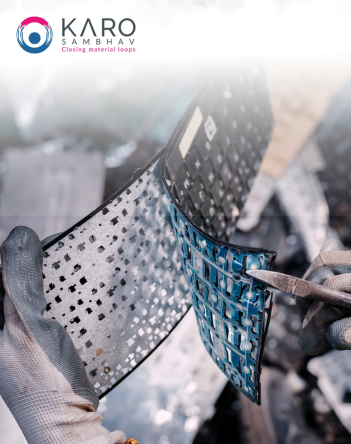Karo Sambhav collaborates with leading organisations to jointly develop industry frameworks, standards, governance mechanisms, systems and processes that advance the transition to circular economy. know more about our alliances.
The rapid evolution of technology in recent decades makes it far-fetched to picture a world without smart televisions, air conditioners, smartphones, laptops, GPS devices, and an array of upgraded digital equipment. Of course, the revolutionary change is praiseworthy. However, the odds are just as significant. Wondering how? Well, the counts of electronic waste have spiked by leaps and bounds. Reportedly, over 50 million metric tonnes of e-waste are produced worldwide every year. India alone generated approximately 1014961.2 tonnes of electronic garbage in 2019-2020. The unprecedented spike in waste is quite a concern.
If you are not aware already, only 20% of the generated electronic garbage is dismantled and recycled. Surely an underwhelming number, clearly suggesting that the untreated waste is left as it is adding to the solid waste stream. It is no surprise that the surging e-waste problem calls for a greater emphasis on strategic waste management policies. As a part of the initiative, businesses are now held accountable for how they handle trash, including electronic waste.
Enterprises, small or large, utilise tech devices and software to operate. Ever wondered how the old computers and hard drives that are no longer needed are discarded? The gadgets are either dismantled or illegally dumped into landfills. Rarely do people realise that the heavy metals and chemicals in the devices contribute to the adversities of toxic leaching. It leaks into the soil contaminating the earth and befouling the groundwater. Besides, the toxic components emit dangerous gases that harm the environment and human beings. Hence, encouraging businesses to ensure appropriate and guided e-waste recycling in India is desperately needed.
Electronic waste is a fast-growing environmental concern. In addition to the environmental dangers, e-waste management is also about maximising the conservation of resources in production circles. This, in a nutshell, is also termed circular economy and stands out as a proactive measure of sustainable waste management. In the face of the ongoing planetary crisis, it is rather crucial for manufacturers and business eggheads to adopt practices supporting guided e-waste management. Are you curious to learn the hacks for reducing and tackling easy disposal of electronic garbage? Let’s keep reading:
Repairing and refurbishing electronic products never runs out of fashion.
Are you quick to replace an old gadget as soon as it shows signs of fraying? Of course, the urge to purchase or switch your existing devices with upgraded products is high, considering the frequent and fascinating new launches. Unfortunately, this also implies heightened volumes of electronic garbage. Companies, too, are hasty when declaring equipment obsolete and unfit for use. Little do companies understand the aftermath of trashing away gadgets mindlessly. Instead, businesses must invest in equipment that is long-lasting and sustainable. This defies the need to update the products every year. Also, it is an eco-friendly measure of waste management.
Donate all obsolete products
When expanding a team or remodelling an office, you might discover electronic products that are operational but only partially functional for office use. Most likely, businesses get rid of the products in a jiffy without contemplating options like recycling and e-waste management. Choose to donate the old and obsolete devices instead. Find schools, charities, and vulnerable communities that need the equipment to learn, grow, work, and thrive.
Donating and not discarding electronic items is an excellent way to tackle e-waste.
Cut down on your unnecessary purchases.
One of the easiest and most sustainable waste management solutions is to curb the generation of e-waste or trash. Businesses must focus on minimising redundant electronic purchases right from the start. This naturally decreases the count of waste generated.
Understand the perks of buy-back programmes.
Do you know what a buy-back programme is all about? It typically refers to a contract between a consumer and a seller. According to the contract, the seller readily agrees to buy the same product when sold at a later date in exchange for a certain value or newer product. Buy-back schemes are excellent for businesses looking forward to purchasing products in bulk.
Keep tabs on authorised recycling centres in your area.
It is no secret that over 60% of electronic garbage remains plaguing landfills. E-waste recycling in India is not as hardwon as you imagine. Find your local recycling options or collection centres and hand over your spent electronic goods to the designated centres. It surely is a good way to keep landfills free from extra clutter.
Unpredictable consumer behaviour and rapid technological advances cannot be avoided. Hence, fostering the idea of recycling other than mindless discarding of electronic products must be repeated on a loop until it becomes a lifestyle. Producer responsibility organisations like Karo Sambhav are dedicated to gearing businesses with adequate waste management strategies for a cleaner and sustainable environment.
Karo Sambhav collaborates with leading organisations to jointly develop industry frameworks, standards, governance mechanisms, systems and processes that advance the transition to circular economy. know more about our alliances.





